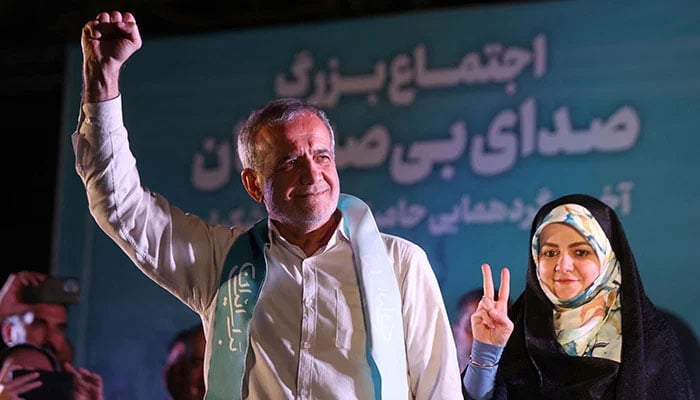Winds of change?
Former heart surgeon and Iranian health minister Masoud Pezeshkian is to be Iran’s next president
The people of Iran have spoken: former heart surgeon and Iranian health minister Masoud Pezeshkian is to be Iran’s next president. Pezeshkian campaigned on a platform that included promising more liberties and equal rights and improving ties with the West. The only moderate on the candidate list in last week’s Iranian presidential elections, his ascension to the role of president follows the death of former president and perceived hardliner Ebrahim Raisi in a helicopter crash in May. As per reports, many were surprised that Pezeshkian was even allowed to run, given that Iran’s Guardian Council, the body that vets potential candidates, has historically not welcomed reformists. Although Pezeshkian’s approval by the Council and victory are being seen as a sign that a shift in stance may be coming in Iran: a shift to a more moderate position, there is still a lot of scepticism about his ability to push through any meaningful changes past Iran’s relatively conservative parliament and system. Pezeshkian has described himself as a ‘reformist principlist’ and was careful to balance promises of a new direction with affirmations of loyalty and praise for Iran’s Supreme Leader Ayatollah Ali Khamenei and his beliefs in the principles of the 1979 Iranian Revolution.
This is a balancing act that will likely define the president-elect’s time in power. There is also the fact that change is hard to push through in systems where the distribution of power is more centralized. That being said, Pezeshkian’s toughest challenges likely lie outside of Iran’s borders in Washington DC and Tel Aviv. The former’s decision to unilaterally back out of the 2015 nuclear deal led to the resumption of cruel and unfair sanctions on Iran, a price it has had to pay for its stance on issues such as Palestine and for resisting neo-colonialism in the Middle East in general. Though Pezeshkian is reportedly in favour of diplomatic engagement with the US to revive nuclear talks and has pledged to remove Western sanctions, it is unclear if the US will be willing to play ball. Iran’s support for Palestine in the context of the ongoing Israeli assault on Gaza and the high chances of Donald Trump’s return to the White House, the man who backed out of the deal the last time he was president, do not bode well for any reformist intent. This will also make it harder to address Iran’s economic difficulties.
This is how the hardline stance adopted by the US-led West, which goes hand-in-hand with its blind support for the Zionist state, makes it difficult to pursue peace and normal relations in the Middle East even when those willing to talk are in power. As long as such a dishonest broker remains the main broker in the region, prospects for peace, prosperity and justice will remain rather bleak. That being said, one can only wish Iran the best. Including Pakistan, this is a region that needs reform, no matter how bleak the chances.
-
 Blac Chyna Reveals Her New Approach To Love, Healing After Recent Heartbreak
Blac Chyna Reveals Her New Approach To Love, Healing After Recent Heartbreak -
 Royal Family's Approach To Deal With Andrew Finally Revealed
Royal Family's Approach To Deal With Andrew Finally Revealed -
 Super Bowl Weekend Deals Blow To 'Melania' Documentary's Box Office
Super Bowl Weekend Deals Blow To 'Melania' Documentary's Box Office -
 Meghan Markle Shares Glitzy Clips From Fifteen Percent Pledge Gala
Meghan Markle Shares Glitzy Clips From Fifteen Percent Pledge Gala -
 Melissa Jon Hart Explains Rare Reason Behind Not Revisting Old Roles
Melissa Jon Hart Explains Rare Reason Behind Not Revisting Old Roles -
 Meghan Markle Eyeing On ‘Queen’ As Ultimate Goal
Meghan Markle Eyeing On ‘Queen’ As Ultimate Goal -
 Kate Middleton Insists She Would Never Undermine Queen Camilla
Kate Middleton Insists She Would Never Undermine Queen Camilla -
 Japan Elects Takaichi As First Woman Prime Minister After Sweeping Vote
Japan Elects Takaichi As First Woman Prime Minister After Sweeping Vote -
 King Charles 'terrified' Andrew's Scandal Will End His Reign
King Charles 'terrified' Andrew's Scandal Will End His Reign -
 Winter Olympics 2026: Lindsey Vonn’s Olympic Comeback Ends In Devastating Downhill Crash
Winter Olympics 2026: Lindsey Vonn’s Olympic Comeback Ends In Devastating Downhill Crash -
 Adrien Brody Opens Up About His Football Fandom Amid '2026 Super Bowl'
Adrien Brody Opens Up About His Football Fandom Amid '2026 Super Bowl' -
 Barbra Streisand's Obsession With Cloning Revealed
Barbra Streisand's Obsession With Cloning Revealed -
 What Did Olivia Colman Tell Her Husband About Her Gender?
What Did Olivia Colman Tell Her Husband About Her Gender? -
 'We Were Deceived': Noam Chomsky's Wife Regrets Epstein Association
'We Were Deceived': Noam Chomsky's Wife Regrets Epstein Association -
 Patriots' WAGs Slam Cardi B Amid Plans For Super Bowl Party: She Is 'attention-seeker'
Patriots' WAGs Slam Cardi B Amid Plans For Super Bowl Party: She Is 'attention-seeker' -
 Martha Stewart On Surviving Rigorous Times Amid Upcoming Memoir Release
Martha Stewart On Surviving Rigorous Times Amid Upcoming Memoir Release




